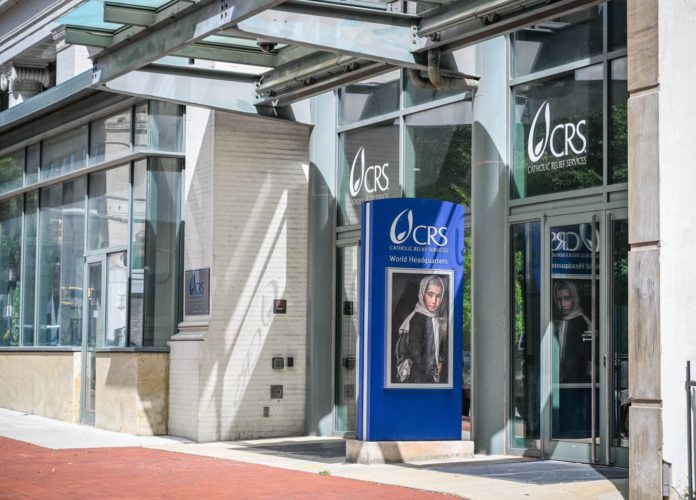A federal judge has ruled that Baltimore-based Catholic Relief Services must offer health care coverage to the spouses of gay employees as long as the employees’ jobs are nonreligious in nature.
U.S. District Judge Catherine C. Blake ruled last week that the worldwide charity violated federal law in 2017 when it withdrew coverage from the husband of a male employee on the grounds that doing so fell within its rights as a faith-based institution.
Advertisement
Blake wrote in a 23-page memorandum on the case that such a claim was invalid because it violated the employee’s rights under Title VII of the 1964 Civil Rights Act, a provision that “prohibits employment discrimination based on race, color, religion, sex and national origin.”
The question of how, or whether, that provision applies to religious organizations has been a subject of intense debate ― and not a little litigation — in legal circles in recent years.
Advertisement
Eve Hill, a co-counsel for the plaintiff in the lawsuit, said Blake’s ruling is something of a landmark at a time when faith-based institutions are trying to expand the scope of their religious-freedom rights, sometimes at the expense of the civil rights of individuals.
“This ruling means that religious entities are not exempt from the laws that prohibit sex discrimination, including discrimination based on sexual orientation,” said Hill, an attorney with Brown, Goldstein & Levy in Baltimore. “Their argument was that their religion exempts them. It’s important that this judge agreed with us.”
:quality(70)/cloudfront-us-east-1.images.arcpublishing.com/tronc/B24LDJXK6BG73JNB2CORRSL6U4.jpg)
Blake’s ruling does not define the process by which CRS must alter its policies on dealing with the spouses of gay employees, should it decide not to appeal or request a stay of her decision.
Nikki Gamer, a CRS spokeswoman, said in an email to The Baltimore Sun that the charity is weighing possible responses to the ruling, which Blake filed Aug. 3 in federal court in Baltimore.
“We are aware of the recent ruling and considering our options,” Gamer wrote. “We will continue working to resolve this important issue as soon as possible. We have no further comments at this time.”
The dispute at the heart of the lawsuit got underway in 2016, after CRS hired a man as a data analyst.
He’s identified in the court filings as “John Doe.” In an interview with The Sun, he requested continued anonymity out of concern he might be harassed and because his spouse, who grew up in a country that bans homosexuality, has not publicly identified himself as gay.
Before accepting the job offer, Doe asked a benefits manager whether CRS, the international humanitarian agency of the Catholic community in the United States, would offer his husband health care coverage through its insurance carrier. The manager said yes, the agency acknowledged in the lawsuit, and the coverage began after Doe started work.
Advertisement
CRS acknowledged that it continued to offer the spouse coverage through Aetna for months, until a human resources executive learned of the benefit and set out to terminate it.
In keeping with the Catholic Church’s opposition to same-sex marriage, CRS agency policy is to refuse coverage for the spouses of same-sex employees, the executive told Doe, according to the lawsuit. The executive said the benefits manager erred in offering it.
Doe met with agency representatives numerous times over the next few months to attempt to address the dispute. At one point, CRS officials offered him a $5,000 raise and other considerations as compensation. Doe declined, and CRS terminated the coverage Oct. 1, 2017. Doe filed the lawsuit nearly three years later.
In his interview with The Sun, Doe cast his decisions about the case as the culmination of years of experiences dealing with discrimination over his identity as a gay man. Raised within a conservative religious community, Doe said he suffered from teasing and verbal abuse while growing up, and that those experiences left him with scars he didn’t know how to address.
Years later, he said, a career transition brought him into the field of international development, and it was not long after completing graduate school that he spotted a notice for a data-analyst job at CRS. Though competition for jobs in the field is intense, he said, he would carefully read employment notices from faith-based humanitarian agencies to ensure the openings didn’t call for employees to proselytize, preach or engage in other overtly religious activities.
“I saw plenty of openings like that, and those agencies are fully entitled to offer them. But if they came with those kinds of requirements, I simply didn’t apply,” he said.
Advertisement
The CRS opening mentioned no such criteria. Doe accepted the offer, he said, with the understanding that the work would be secular in nature.
“When it comes to my work, honestly, if the word ‘Catholic’ were not in the name of the agency, I wouldn’t even know it was a religious organization,” said Doe, who continues to work there.
Asked why he would continue his employment at an organization he believes disadvantages gays, he said the job is a good one, his colleagues are open-minded and understanding, and he has decided he will not move to another until it represents an advancement in his career.
“Jobs in international development are hard to come by,” he said. “I’m not going to discriminate against myself by just taking any job anywhere. I’m not going to leave CRS unless it’s for a better opportunity.”
White, Leary and other attorneys on his team centered their argument on the idea that, while religious organizations enjoy greater latitude in exercising what they view as their religious freedoms than they did as recently as 20 years ago, such changes on the legal landscape have their limits.
Advertisement
Nancy Modisett, a professor at the University of Baltimore School of Law, said seminal cases such as Burwell v. Hobby Lobby in 2014 and Bostock v. Clayton County in 2020 showed the U.S. Supreme Court is “more amenable to claims involving religious organizations and their freedoms than has historically been the case.”
The Morning Sun
Daily
Get your morning news in your e-mail inbox. Get all the top news and sports from the baltimoresun.com.
In the Hobby Lobby case, the court found that a federal mandate for health insurance coverage of birth control violated privately owned, for-profit corporations’ right to religious freedom. The Bostock ruling, meanwhile, established that employment discrimination against gay, transgender or gender-fluid individuals constitutes sex discrimination, which is banned by the Title VII provision of the Civil Rights Act.
Those and other cases have pushed into the spotlight important questions about how religious freedoms and Title VII protections should be balanced, Modisett said, and the ruling in John Doe v. Catholic Relief Services “brings the question into the employment setting.”
Blake ruled, among other things, that while religious institutions are free to restrict some positions to members of their faith or those who subscribe to its beliefs — a Catholic agency cannot be forced to hire a Protestant minister, for example — such freedoms do not extend to jobs unaffected by religious considerations.
“For ministerial positions, you can prefer Catholics, but this shows that when it comes to nonminister positions, you don’t just get carte blanche,” Modisett said.
Blake’s ruling was first reported by Bloomberg Law.
Advertisement
For his part, Doe said he hopes CRS accepts the ruling, as the thought of “this case continuing and reaching an even higher profile is terrifying.” But he’s resolved to keep it moving forward, if necessary.
“It’s also exciting to be a part of this, because if this ruling sticks, and I would have played a part in bringing health insurance to the hundreds, if not thousands, of gay people working in secular roles within religious organizations, that would be amazing,” he said. “If they appeal it, so be it. I’m in this for the long game.”








